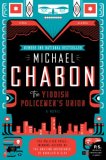Summary | Excerpt | Reading Guide | Reviews | Beyond the Book | Read-Alikes | Genres & Themes | Author Bio

Critics' Opinion:
Readers' Opinion:
First Published:
May 2007, 432 pages
Paperback:
Apr 2008, 464 pages
 Book Reviewed by:
Book Reviewed by:
BookBrowse Review Team
Buy This Book
This article relates to The Yiddish Policemen's Union
Over the years a number of different plans for a Jewish homeland have been proposed. A 1903 British proposal offered 5,000 square miles of the Mau Plateau (in what is now Kenya) to the Jewish people as a homeland. This offer, presented at the sixth Zionist Congress in Basel, was in response to pogroms against the Jews in Russia. The proposal resulted in fierce debate - the Russians stormed out in opposition and some groups felt it would make it more difficult to establish a Jewish homeland in Palestine. Nevertheless, the motion passed by 295 to 177 votes. The following year a 3-man delegation visited the plateau and found the climate acceptable, but they also found a large number of Maasai already living there who weren't at all amenable to the idea of newcomers. So, in 1905 the Congress declined the British offer. The proposal was revived by Winston Churchill in WWII but by that time Zionist organizations were firmly committed to settling in Palestine.
Another proposal was that the island of Madagascar, off the coast of Africa, should become a Jewish colony. Apparently the governments of Britain, France and Poland had all contemplated Madagascar as an option in the early 20th century, but it was the Nazi Germans who came closest to making it a reality. In May 1940, in his Reflections on the Treatment of Peoples of Alien Races in the East, Heinrich Himmler declared: "I hope that the concept of Jews will be completely extinguished through the possibility of a large emigration of all Jews to Africa or some other colony." At the time, Madagascar was a French colony but, as the Germans had just overrun France, that little stumbling block was no longer an issue. However, the plan did hit a roadblock when it became apparent that Britain was not going to concede quickly (the Nazis planned on using the British Navy to transport the Jews); and when British and Free French forces took back Madagascar in 1942 all talk of creating a "super ghetto" was ended and the Germans embarked on the "Final Solution" instead.
Another suggested homeland was proposed by Rep. Charles Buckley in 1938. Buckley issued an open letter to Roosevelt asking support for legislation that would make the frontier territory of Alaska a haven for refugees fleeing the Nazis. Despite the political risks, Roosevelt did not dismiss the Alaska idea entirely. He referred the matter to Interior Secretary Ickes who ordered department lawyers to come up with a study of the idea. When the plan was ready in August 1939, Ickes called a press conference and endorsed its finding that immigration restrictions were holding back the development of Alaska. Eventually, Roosevelt, facing political pressure, turned down the proposal.
For more background to this storyread this article from the Anchorage Daily News, 1999; or listen to an NPR interview withRichard Breitman, a professor of history at American University, who talks about the Alaskan resettlement plan.
Filed under Places, Cultures & Identities
![]() This "beyond the book article" relates to The Yiddish Policemen's Union. It originally ran in May 2007 and has been updated for the
April 2008 paperback edition.
Go to magazine.
This "beyond the book article" relates to The Yiddish Policemen's Union. It originally ran in May 2007 and has been updated for the
April 2008 paperback edition.
Go to magazine.





The Flower Sisters
by Michelle Collins Anderson
From the new Fannie Flagg of the Ozarks, a richly-woven story of family, forgiveness, and reinvention.

The House on Biscayne Bay
by Chanel Cleeton
As death stalks a gothic mansion in Miami, the lives of two women intertwine as the past and present collide.

The Funeral Cryer by Wenyan Lu
Debut novelist Wenyan Lu brings us this witty yet profound story about one woman's midlife reawakening in contemporary rural China.
Your guide toexceptional books
BookBrowse seeks out and recommends the best in contemporary fiction and nonfiction—books that not only engage and entertain but also deepen our understanding of ourselves and the world around us.